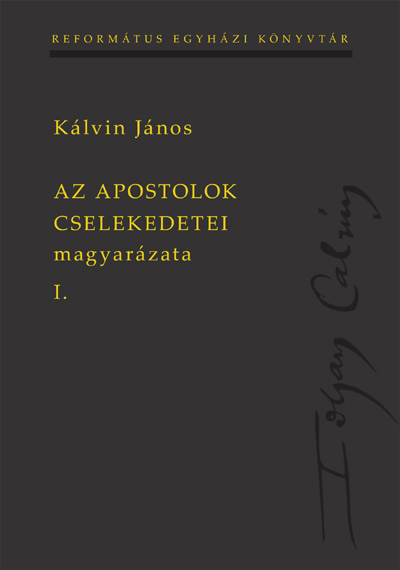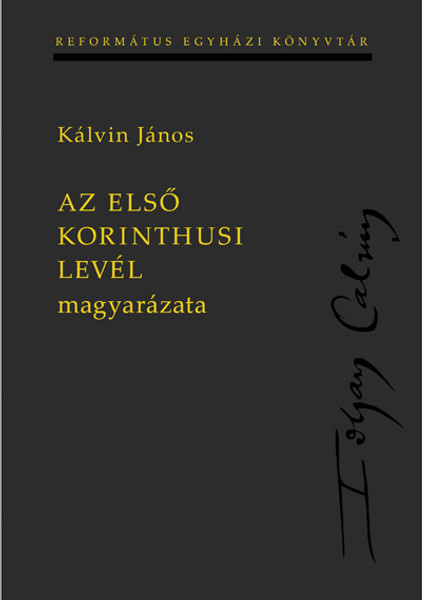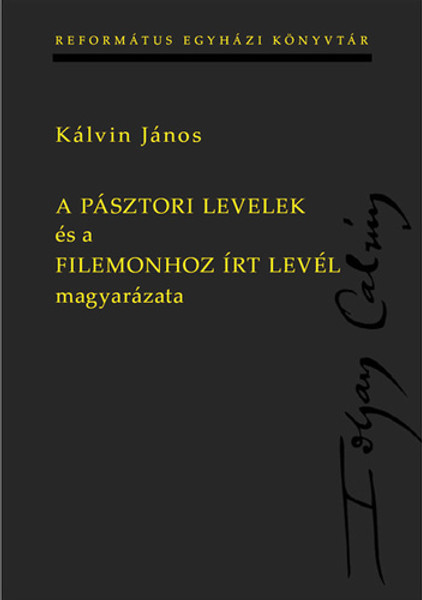Description
Az Apostolok Cselekedetei magyarázata I-II. by John Calvin
Hungarian Translation of John Calvin's Bible Commentaries On The Acts of the Apostles I.-II.
Overview:
"Az Apostolok Cselekedetei magyarázata I-II." is a profound exploration of the Acts of the Apostles through the lens of one of the most influential theologians of the Protestant Reformation, John Calvin. This comprehensive commentary delves into the historical and theological significance of the early church as narrated in the Acts, providing readers with an insightful perspective on the growth of Christianity and the work of the Holy Spirit among the apostles.
Product Features:
- Format: Hardcover
- Pages: 416 + 324
- ISBN-13: 978-9635581528
- ISBN-10: 9635581521
- Publisher: Kálvin
- Publication Year: 2010
- Language: Hungarian
- Original Work: John Calvin's Commentaries on the Acts of the Apostles
About the Author:
John Calvin (10 July 1509 – 27 May 1564) was a prominent French theologian, pastor, and reformer who played a pivotal role during the Protestant Reformation. A key figure in the development of Calvinism, his theological contributions include doctrines of predestination and the absolute sovereignty of God.
Calvin's influence extends across various Christian denominations, particularly among Congregational, Reformed, and Presbyterian churches. His writings include the Institutes of the Christian Religion and commentaries on nearly all biblical books. Originally trained as a lawyer, Calvin shifted his focus to theology, breaking from the Roman Catholic Church around 1530. His life was marked by passionate advocacy for reform, tireless writing, and engagement with contemporaries such as Philipp Melanchthon and Heinrich Bullinger.
Interesting Facts:
- Calvin's commentaries are known for their clarity, depth, and rigorous analysis, making them a valuable resource for scholars, theologians, and lay readers alike.
- The Acts of the Apostles serves as a crucial narrative of the early church, illustrating the challenges and triumphs faced by the apostles in spreading the Gospel message.
- Calvin was not only a theological writer but also a significant church leader, influencing church governance and liturgy during his time in Geneva.
- His commentary on the Acts highlights the workings of the Holy Spirit and the establishment of the early church, offering readers profound insights into the formation of Christian doctrine and practice.
Publishers:
- Publisher: Kálvin Kiadó
- Year of Publication: 2010
- Edition: Hungarian translation of Calvin's commentaries
We welcome your feedback! Share your thoughts on this product to help others in their journey of faith and understanding. Your review is important to us!
Hashtags:
#ApostolokCselekedetei #JohnCalvin #BibliaMagyarázatok #KálvinKiadó #ProtestánsReformáció #KeresztényIrodalom #BibliaiTanulmányok #Calvinizmus #Szentírás #TeológiaiÍrások
Hungarian Version
Az Apostolok Cselekedetei magyarázata I-II. - John Calvin
A "John Calvin's Bible Commentaries On The Acts of the Apostles I.-II." magyar fordítása
Áttekintés:
"Az Apostolok Cselekedetei magyarázata I-II." mélyreható áttekintést nyújt az Apostolok Cselekedeteiről, amelyet a protestáns reformáció egyik legnagyobb hatású teológusa, John Calvin írt. Ez a széleskörű kommentár feltárja a korai egyház történelmi és teológiai jelentőségét, bemutatva a kereszténység növekedését és a Szentlélek munkáját az apostolok között.
Termékjellemzők:
- Formátum: Keménykötésű
- Oldalak száma: 416 + 324
- ISBN-13: 978-9635581528
- ISBN-10: 9635581521
- Kiadó: Kálvin
- Kiadás éve: 2010
- Nyelv: Magyar
- Eredeti munka: John Calvin kommentárjai az Apostolok Cselekedeteiről
Szerzőről:
John Calvin (1509. július 10. – 1564. május 27.) jelentős francia teológus, pásztor és reformátor, aki a protestáns reformáció idején játszott központi szerepet. A calvinizmus kialakulásának egyik kulcsszereplője, teológiai hozzájárulásai közé tartozik a predestináció és az Isten abszolút szuverenitása a megváltásban.
Calvin hatása széleskörűen elterjedt a különböző keresztény felekezetek között, különösen a gyülekezeti, református és presbiteriánus egyházak körében. Írásai között megtalálhatók az Institúciók a keresztény vallásról és a Biblia szinte minden könyvéről írt kommentár. Eredetileg jogászként végzett, de a vallási reformáció iránti elkötelezettsége miatt 1530 körül elhagyta a katolikus egyházat. Élete során szenvedélyesen szorgalmazta a reformot, írt, és számos reformátorral, mint például Philipp Melanchthon és Heinrich Bullinger, levelezett.
Érdekességek:
- Calvin kommentárjai a világ egyik legértékesebb teológiai forrásai, amelyek mélységet és tisztaságot kölcsönöznek a bibliai szövegek értelmezésének.
- Az Apostolok Cselekedetei a korai egyház alapvető narratívája, amely bemutatja az apostolok által megélt kihívásokat és diadalokat a Biblia üzenetének terjesztésében.
- Calvin nemcsak teológiai író volt, hanem jelentős egyházi vezető is, aki a genfi egyház kormányzását és liturgiáját befolyásolta.
- Kommentárja az Apostolok Cselekedeteiről a Szentlélek munkáját és a korai egyház megalapozását hangsúlyozza, mélyebb megértést nyújtva a keresztény doktrína és gyakorlat fejlődéséről.
Kiadók:
- Kiadó: Kálvin Kiadó
- Kiadás éve: 2010
- Kiadás: A Calvin kommentárjainak magyar fordítása
Számítunk véleményére! Ossza meg tapasztalatait ezzel a termékkel, hogy segítsen másoknak a hit és a megértés útján. Véleménye fontos számunkra!
Hashtagek:
#ApostolokCselekedetei #JohnCalvin #BibliaiMagyarázatok #KálvinKiadó #ProtestánsReformáció #KeresztényIrodalom #BibliaiTanulmányok #Calvinizmus #Szentírás #TeológiaiÍrások











